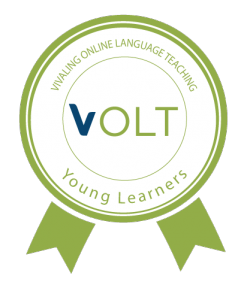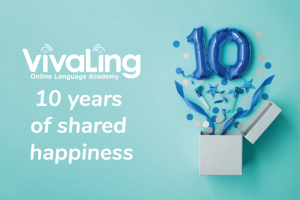VivaLing Online Language Teaching Young Learners
The future of language teaching is online. Global connectivity and collaboration combined with technology will enable educators to provide interactive and highly customized lessons. Today’s children are equipped with everything they need to benefit from this transformation in education. Are you? Do not stay behind.
The VivaLing Online Language Teaching – Young Learners Certificate (VOLT- YL) prepares you for this new paradigm through exposure to a perfect blend of theory and practical teaching advice.
The VOLT- YL is a professional development program for trained teachers who would like to advance or extend their skills in teaching languages to children (ages 3-15), in an online or technologically rich environment.
A Comprehensive Program
By the end of this program, candidates will have demonstrated the ability to:
- Plan and deliver instruction that engages the five language learning drivers for children
- Understand the VivaLing Language Learning Approach and research-based methodology for teaching languages
- Incorporate a variety of child-centered online tools, materials, and activities into lessons
- Utilize technology to engage children and enhance the learning process
- Apply their learning in online sessions with young learners
What’s in it for me?
Thanks to VOLT-YL, you will be able to:
- Develop your skills and grow professionally
- Network and learn from other professional educators around the globe
- Keep up with the latest trends in language teaching
- Gain experience in online teaching
- Earn a certificate validating your skills in online teaching for children

The Candidates
To be eligible for the VOLT-YL, candidates should meet the following criteria:
- A native speaker of English, Mandarin, French, or Spanish
- A minimum of two years of prior language teaching experience
- A good rapport and interest in teaching children
- A minimum Internet bandwidth of 1.2 Mbps
- A computer with processor of Core 2Ghz or higher (i3/i5/i7 or AMD equivalent)
- A computer with a minimum RAM of 4GB (8GB recommended)



The Program
The program runs over the course of 12 weeks, with the first four weeks dedicated to training and observation, and the final eight weeks for online teaching practice and feedback. The estimated time commitment is 10 hours per week.
In total, the program includes 120 hours of blended learning.
Learning Phase
During the first four weeks of the course, candidates will develop their skills through four blended-learning modules.
Each module will consist of self-guided instruction, observation of recorded VivaLing session videos, assignment preparation, and two virtual meetings with other candidates and experienced VOLT-YL Trainers.
The virtual meetings will occur at fixed times scheduled before the course begins. All other tasks may be completed at the candidate’s convenience.


The Modules
After being equipped with the necessary knowledge and skills, candidates will be given the chance to put the ideas into practice during eight weeks of observed online teaching practice.
During this phase, candidates will plan lessons, teach VivaLing young learners using our online platform, reflect on their own teaching practice, receive individualized feedback from other candidates and VOLT-YL trainers, observe their peers’ teaching practice and offer feedback, and complete an independent study project in a related interest area.
Each of the five course modules includes self-guided course materials and training, based on scientific findings and the collective experience of tens of thousands of VivaLing online sessions delivered to-date.
This knowledge is further complemented with online collaboration and discussion with peers and course trainers, interactive virtual meetings, and practical assessment tasks.
The topic areas for each module are as follows:
- Learning Phase (4 weeks)
- Module 1: Teaching Children
- Module 2: Teaching Languages
- Module 3: Teaching Online
- Module 4: Teaching Team
- Practice Phase ( 8 weeks)
- Module 5: Observed Online Teaching Practice
Assessment Overview
In order to obtain certification, candidates must successfully complete a practical assessment task for every module, which both exhibits their understanding of the topic and applies that knowledge to the online teaching context.
The written assignments for each module are as follows:
- Module 1: Written analysis of VivaLing coach session videos
- Module 2: Preparation of lesson plan with appropriate learning objectives
- Module 3: Research and review of an online tool or resource
- Module 4: Independent-study presentation in a chosen speciality area
- Module 5: Self-reflection on teaching practice in the form of a journal, blog or vlog
These five written assignments and a summative teaching practice mark will contribute to the final assessment result of: Distinction, Pass, or Fail.
Evaluation of Teaching Practice
A summative teaching practice mark will be based on the candidate’s development in:
- Activating the Language Learning Drivers
- Child-Centered Pedagogy
- Choosing Appropriate Content, Activities, and Materials
- Classroom Management and Learning Infrastructure
- Utilizing Technology to Enhance Learning
- Establishing Rapport and Communication
The Certification
Candidates who successfully complete the course will obtain:
- a final result of: Distinction or Pass
- a certification that qualifies them to teach languages to children using technology
- individualized results available in a searchable online database that can be shared with future employers or on the candidate’s résumé
Exceptional candidates may be offered a position as an Advanced Coach by VivaLing upon completion of the program.





